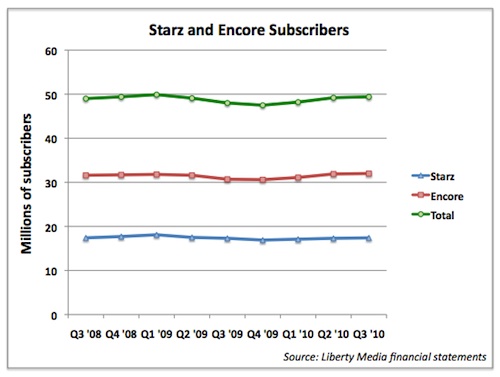-
Starz's 2-Year Results Defy Warnings of "Cord-Shaving"
If you're looking for evidence that the pay-TV industry is imperiled by the rise of over-the-top services that are going to cause subscribers to cut the cord, a good early indicator of such behavior would be whether "cord-shaving," i.e. the reduction of services like premium channels, additional outlets and DVR services, is happening already. But a look at the premium channels Starz and Encore - whose content is fully available for streaming on Netflix - suggests no evidence of cord-shaving is yet occurring.
As the graph below shows, since October, 2008, when Starz announced that Netflix had signed a distribution deal for "Starz Play," total U.S. subscribers to the Starz and Encore channels have actually increased slightly from 49 million to 49.4 million. During this time period there's been relatively little fluctuation, with only a temporary dip in the 2nd half of last year that was probably more related to the channels being temporarily out of their Comcast deal, and therefore losing some of their promotional backing. Further, for the first 9 months of 2010, Starz's revenue was $929 million and cash flow was $305 million, up from the same period in 2008, when revenue was $826 million and cash flow was $220 million.
My curiosity about Starz and Encore's performance was piqued when I read the following paragraphs in a recent NY Times story, "Time Warner Views Netflix as a Fading Star":
"The original deal from 2008, in which Netflix paid an estimated $25 million annually - a paltry sum, executives say, compared with the hundreds of millions of dollars cable and satellite companies pay Starz for the same movies - is now seen as a major coup for Netflix, and a major mistake by Starz.
Michael Nathanson, a media analyst at Nomura, called it “probably one of the dumbest deals ever. Starz gave up valuable content for tens of millions of dollars.”
Mr. Bewkes said that deal, which gave Netflix significant momentum into the new world of online video, potentially undermined the business model of cable television, based on the subscription fees that have steadily flowed even as other media businesses have suffered in the digital age. “Why should anyone subscribe to Starz when they can basically get the whole thing for about nothing?” he said. “That doesn’t make much sense.”
In the context of Starz's actual performance over the last 2 years, both Nathanson's and Bewkes' remarks look silly. Nathanson's quote reflects a "Monday morning quarterback" point of view, when one remembers that in mid-2008 Netflix had about 8.5 million subscribers (about half what it has now) and was just getting started in streaming. Though Starz came under fire from its existing pay-TV distributors for dealing with a newfangled distributor, it had an opportunity to generate an additional $25-30 million/year in high-margin revenue and took it. Had it insisted on a deal in the hundreds of millions, Netflix would have simply walked away; it just didn't have the economics or the experience yet with how powerful a model streaming would become.
Starz also got push-back from its studio partners at the time, concerning whether it even had the rights to redistribute their movies online. Disney began to litigate, but since then it (and Sony) have both renewed their Starz deals. In fact, contrary the deal being one of the dumbest ever, it actually laid the groundwork for studios and networks to reap hundreds of millions of dollars in licensing fees per year from Netflix since. Now, having proven its worth, Starz itself may receive $250 million or more when its deal with Netflix is up for renewal next year.
And while Bewkes questions why people should still subscribe to the Starz/Encore channels though pay-TV, the numbers clearly suggest they have continued to do so (in fact, it is HBO that has lost 1.5 million subscribers this year, though Bewkes insisted recently that "nobody should worry about HBO, it will do just fine.") It's not clear why Bewkes would take the unusual step of trash-talking Starz, given its actual performance which he's surely aware of; perhaps he's trying to reinforce to pay-TV distributors that HBO - which doesn't have a Netflix deal - is more aligned with the industry's interests and therefore should receive higher fees? Or maybe he's signaling to Netflix that if it is looking to do a deal with HBO, it would have to pay top dollar because HBO would suffer pay-TV declines.
I'll admit, it's a little counter-intuitive that Starz's and Encore's numbers have held up so well, especially since its content is clearly branded "Starz Play" on Netflix, so anyone with a Starz or Encore subscription through their pay-TV provider would theoretically be aware they're getting similar content via two subscriptions. Granted, Netflix doesn't have HD-quality content from Starz and Encore, but many viewers might not even notice. One explanation is that because Starz and Encore are often bundled with other premium channels (like HBO) by pay-TV operators, they're tougher to drop without broader programming cut-backs. Or maybe inertia's at work and even though people realize the duplication, they're just slow to act. Or maybe because relatively few people yet have connected devices, many still view Starz Play on Netflix as primarily a limited, computer-based viewing experience.
It's hard to say exactly what's going on, except that Starz and Encore are proving so far that adding Netflix as a new distributor hasn't hurt their traditional distribution model. While many in the media are waving their hands about cord-cutting and cord-shaving taking hold, a look at Starz and Encore's 2-year performance suggests that maybe change doesn't happen quite so fast as some people are predicting.
What do you think? Post a comment now (no sign-in required).Categories: Aggregators, Cable Networks
Topics: Disney, Encore, HBO, Netflix, Sony, Starz

